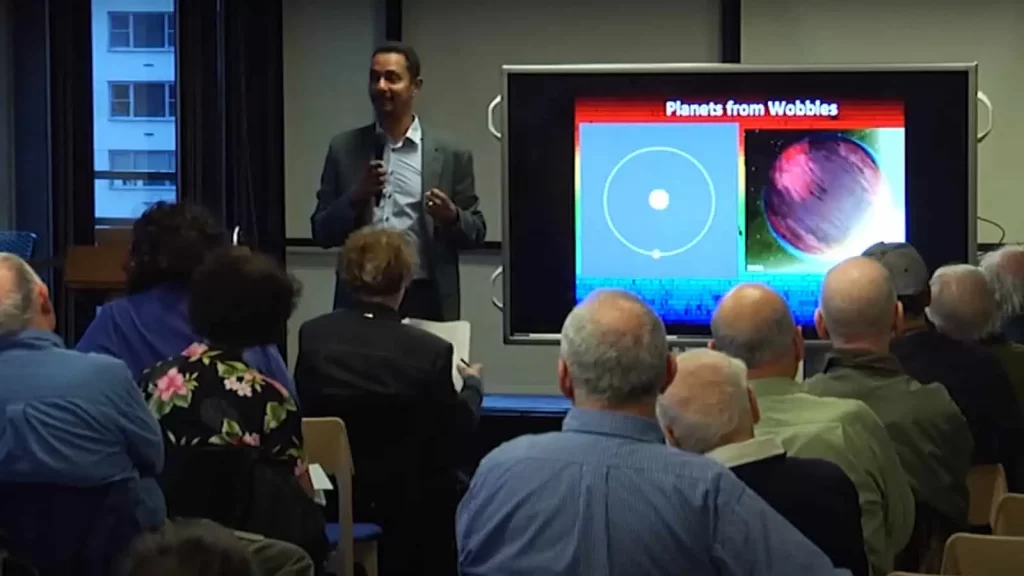Ray Jayawardhana, an accomplished academic leader, renowned and widely published scientist, and award-winning author who presently serves as dean of Cornell University’s College of Arts and Sciences, has been selected as Johns Hopkins University’s 16th provost.
Jayawardhana has led Cornell’s largest and most academically diverse college since 2018, overseeing enhancements to the student experience and the recruitment of 130 new faculty members, increasing the school’s scholarly distinction and impact in the process. He stood out among a strong group of candidates identified during a comprehensive national search.
The executive committee of the university’s board of trustees approved Jayawardhana’s appointment last week. His first day at Johns Hopkins will be Oct. 15.
“Dr. Jayawardhana is a visionary and collaborative leader who is driven by the same passionate pursuit of excellence and discovery that has been the hallmark of our institution since its founding,” JHU President Ron Daniels wrote in a message to the Hopkins community announcing Jayawardhana’s appointment.
“Dr. Jayawardhana’s record of accomplishments, his standards for excellence and integrity, and his commitment to driving collaboration across divisions and disciplines make him the ideal person to serve as Johns Hopkins University’s next provost.”

At Cornell, Jayawardhana has focused on four strategic priorities—faculty renewal and support, research and creative excellence, academic innovation and student experience, and public engagement and impact. During his tenure as dean, the College of Arts and Sciences has adopted a new undergraduate curriculum, introduced first-year advising seminars, implemented a selective and prestigious program that pairs liberal arts pursuits with the study of technology and data, and promoted active learning approaches. He also advanced opportunity and access through a wide range of academic and student programs, established a set of coveted postdoctoral fellowships for outstanding emerging scholars, and elevated public and media engagement dramatically. During his tenure, the college raised more than $300 million in philanthropic support.
Jayawardhana was instrumental in launching enhanced, cross-college departments of sociology, psychology, and economics. He also partnered with deans and faculty across the university to develop and lead signature initiatives in three critical areas of inquiry—climate, artificial intelligence, and quantum research.

As provost at Johns Hopkins, he will serve as the university’s chief academic officer, working closely with President Daniels and with leaders from across JHU on interdisciplinary initiatives, academic policies and procedures, and key priorities that support the university’s research and education missions.
“Johns Hopkins is on a remarkable trajectory, with bold ambitions and tremendous momentum,” Jayawardhana said. “I am excited to join this exceptionally dynamic community, and partner with President Daniels and others to help advance the university’s excellence and impact.”
Prior to joining Cornell’s faculty, Jayawardhana served as dean of science and professor of physics and astronomy at York University in Canada. This followed a decade on the faculty at the University of Toronto, where he served as a Canada Research Chair, professor of astronomy and astrophysics, and senior advisor to the president for science engagement.
A native of Sri Lanka, Jayawardhana earned a bachelor of science degree in astronomy and physics from Yale University and a PhD in astronomy from Harvard. He is the winner of numerous awards and accolades, including a Guggenheim Fellowship, a Rutherford Medal in Physics from the Royal Society of Canada, and a Carl Sagan Medal from the American Astronomical Society’s Division of Planetary Sciences. Asteroid (4668) Rayjay is named after him.
His research focuses on the diversity, origins, and evolution of planetary systems. His group uses large telescopes on the ground and in space to characterize planets outside our solar system, with an eye toward investigating the prospects for life elsewhere in the universe. He is a core science team member for the Near Infrared Imager and Slitless Spectrograph (NIRISS) instrument on the James Webb Space Telescope, and has authored more than 150 refereed papers in scientific journals.
Jayawardhana is also an acclaimed writer whose articles have appeared in The Economist, The New York Times, and The Wall Street Journal, among other publications. He is the author of four books, including Strange New Worlds, an insider’s account of the search for life on other planets; Neutrino Hunters, a tale of the chase for the so-called ghost particle that won the Canadian Science Writers Association’s Book Award in 2014; and Child of the Universe, a children’s book published in 2020 meant to spark the same fascination with our universe that inspired him as a child.
The book aims to convey “the deep and enduring links—both physical and poetic—between the universe and us, and to nurture a sense of wonder about the great beyond,” Jayawardhana writes in his author’s note.
An avid traveler, Jayawardhana has visited more than 55 countries and all seven continents. His travels, for research and writing, have included visits to mountaintop observatories in Chile and Hawaii, a meteorite collecting expedition in Antarctica, a parabolic flight with the European Space Agency, a solar eclipse chase in western Mongolia, and a descent into a South African mine with geobiologists.
He succeeds Sunil Kumar, who served as JHU’s provost from September 2016 through April 2023 and recently became the president of Tufts University. Professor Stephen Gange of the Bloomberg School of Public Health has led the provost’s office on an interim basis since Kumar’s departure.

